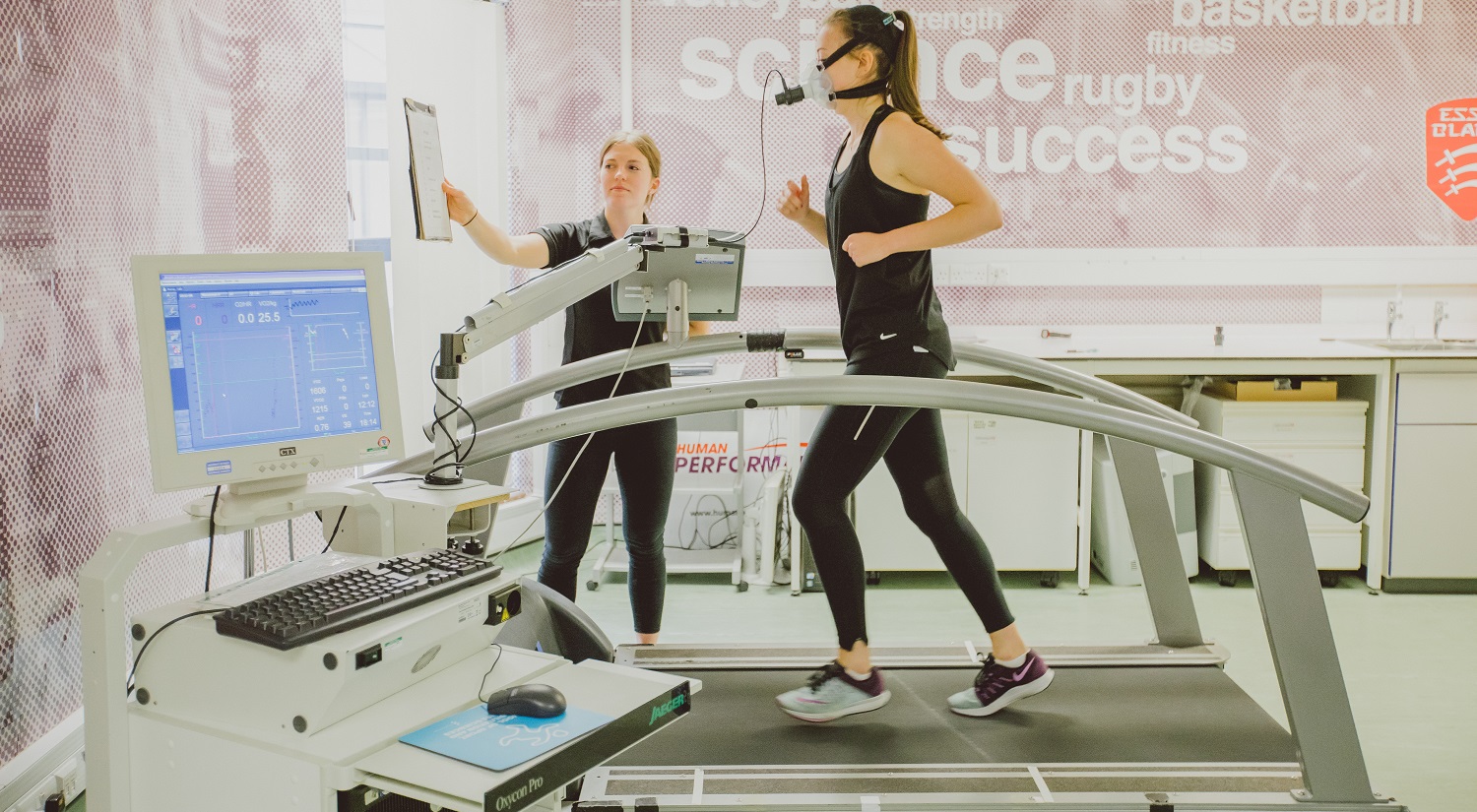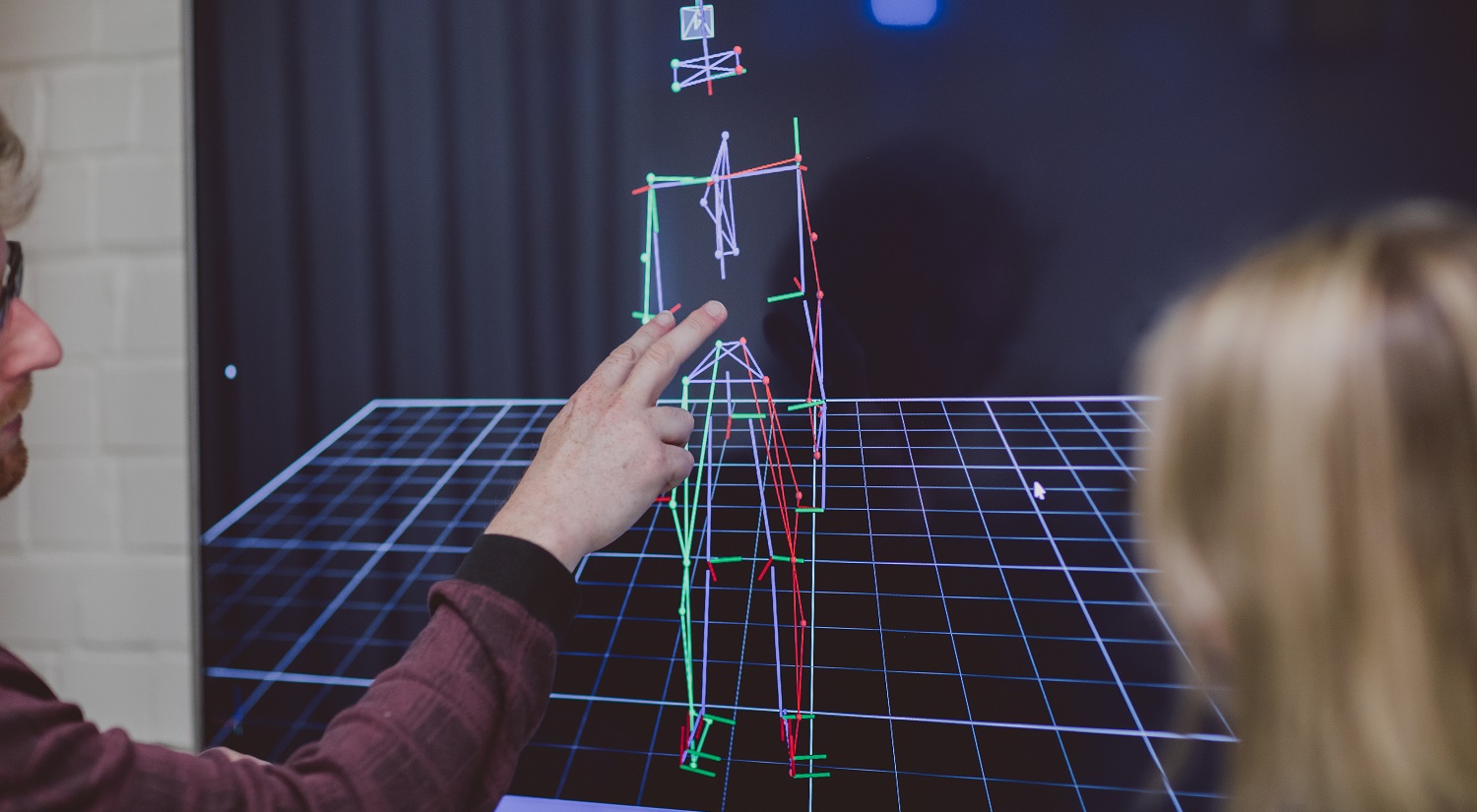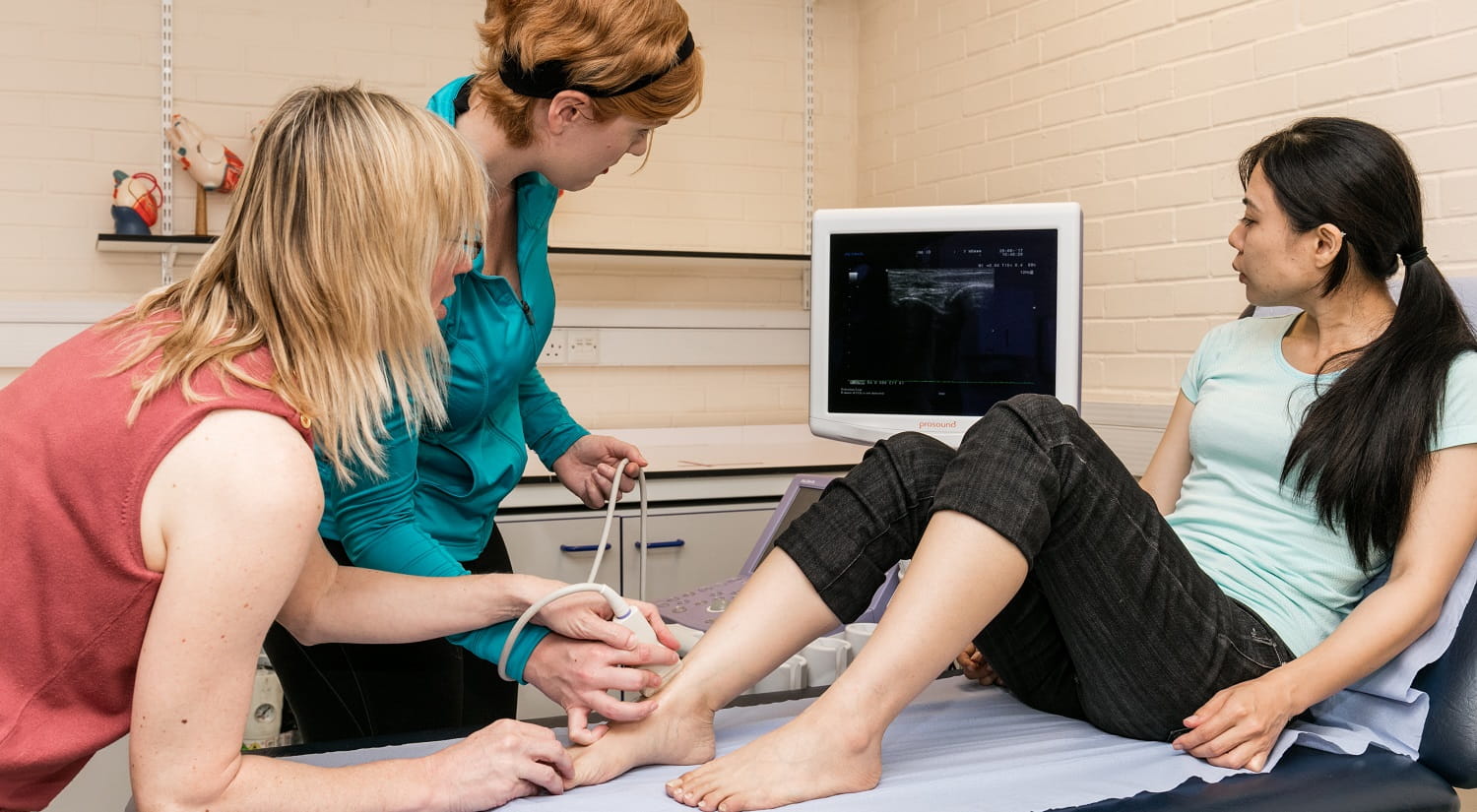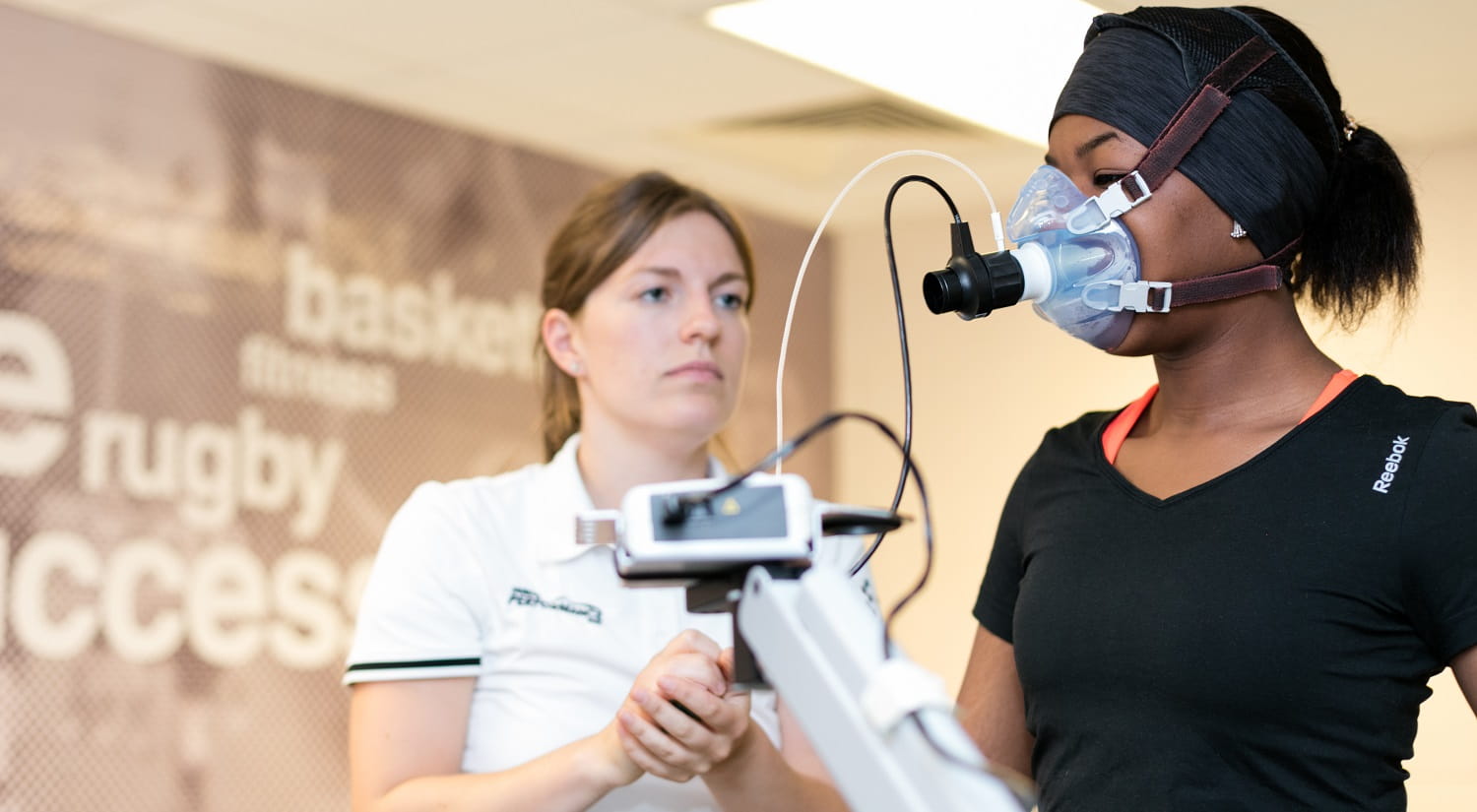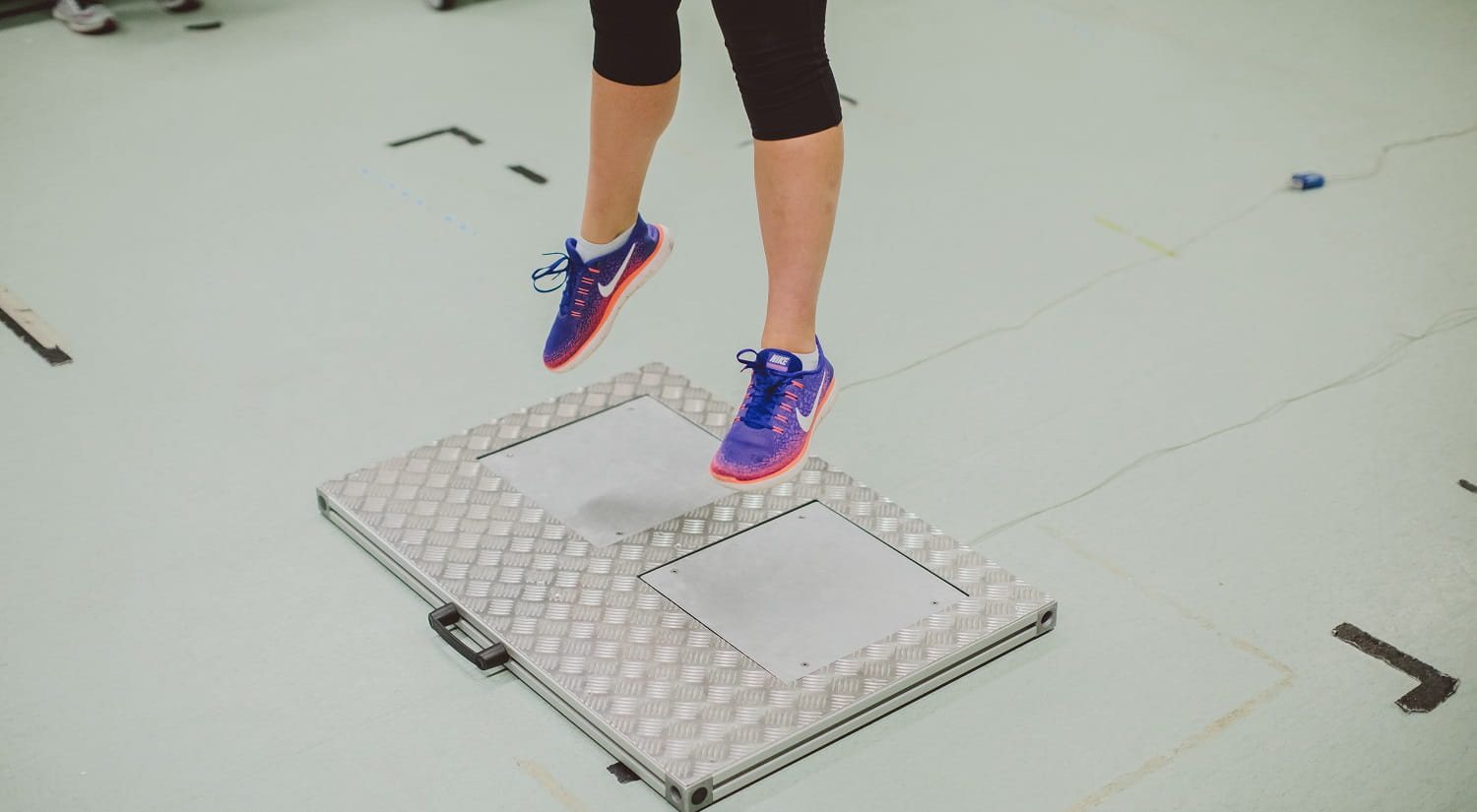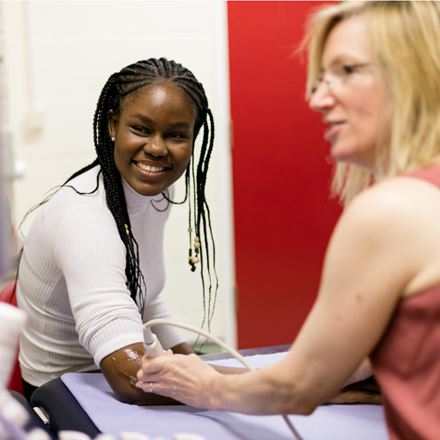Our facilities
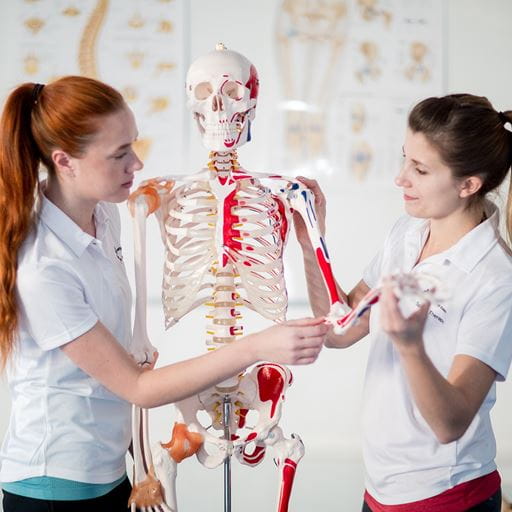
Everything you need for learning and research
Our School of Sport, Rehabilitation and Exercise Sciences is housed in the Essex Sport Arena at our Colchester Campus.
Our state-of-the-art facilities are staffed by our excellent technician team providing support for our students and staff. Our labs are used for teaching many of our undergraduate and Masters students, and support our PhD student research, getting them ready for employment in professional settings by using the same equipment that they will use when they're working professionally. Our world-leading research is facilitated by the labs and investment in cutting-edge equipment housed – do a virtual tour of our facilities.
Our Labs
Physiotherapy labs
We have three dedicated labs for physiotherapy which have recently been refurbished. They are used by students across all our physiotherapy degrees, as well as for some Continuing Professional Development modules.
Our large lab spaces provide flexibility for small and large group practical skills training. They contain all the equipment and facilities you will encounter in various scenarios and locations when you are a qualified physiotherapist, including hospital beds, walking aids, ultrasound and TENS machines, and therapy and diagnosis equipment.
When not used for timetabled teaching, the labs are available to students 24 hours a day, 7 days a week.
Sports therapy labs
We make sure that our sports therapy students leave our School ready for professional employment. As part of this a large proportion of our BSc Sports Therapy is taught in a practical fashion, and our labs reflect this. We have two dedicated labs for sports therapy training and a Sports Therapy Clinic.
Our excellent facilities allow students to learn and gain skills in an environment specifically designed for sports therapy practice. Our labs and Clinic are kitted out with equipment that you will find in any professional clinic or sporting organisation, ensuring that you are familiar with the tools you'll utilise as therapists once you've graduated.
Human Performance Unit
The Human Performance Unit (HPU) has been used by professional athletes and sports persons from a range of disciplines, including Team GB athletes participating in the London 2012, Rio 2016 and Tokyo 2020 Olympics, and players from our local Colchester United Football Club.
The HPU supports student teaching and research across all degree types. Our undergraduates in sports therapy, sports performance and coaching, and sports and exercise science use the HPU for some of their modules, with both beginners and professional sports persons recruited to take part. This gives students experience in managing the practical physiological tests, as well helping them develop soft skills such as communication and teamwork.
Additionally the HPU supports a range of placement activities. Our Masters students can take a 12-week placement, while undergraduates have the option to use the HPU during our optional Placement Year. Along with continuing the work with individual athletes, students who have a placement year as part of their course also assist with sports science workshops held at the HPU for local schools. These workshops are tailored to the National Curriculum for PE, and give our students experience of working with teachers and young people.
Sports psychology lab
The sports psychology lab is used to teach students in our School about the principles of sport and exercise psychology, such as how to manage pressure and anxiety in the run-up to competitions, how to cope with injuries, and how supportive communication with athletes impacts on performance.
Our lab is equipped with iPads and Qualtrics survey software to allow online and offline surveys, as well as Actigraph Accelerometers and a high-quality artificial golf putting green. There is also access to some of the equipment available in the School's other labs, such as exercise ergometers, and portapres (an ambulatory blood pressure device so you can monitor how blood pressure changes as someone moves).
Our students and staff also use the lab for independent research projects, such as those related to our green exercise research.
Biochemistry lab
Biochemistry is an essential part of sports science as it helps us understand the impact of physical activity on the human body at a molecular level. The type of exercise (aerobic vs anaerobic), the length of the exercise session, combined with the physical state of the athlete (including health conditions, injuries, and even their diet), all lead to different bodies reacting differently to the physical activity they carry out.
Our biochemistry lab comes equipped with the tools for our students in BSc Sports and Exercise Science, BSc Sports Therapy, and BSc Sports Performance and Coaching. These tools help students and professionals understand exactly what is happening to an individual, and can inform the advice on next steps for improved training or better rehabilitation.
Equipment in the biochemistry lab
- Biosen C line Clinic Lactate Analyser
- Arkray Lactate Pro/Pro2
- Hemocue Haemoglobin
- Afinion Glucose and Cholesterol
- Cholestech
Biomechanics lab
Biomechanics in sports and exercise looks at the physical actions of the joints, muscles and skeleton when we move and exercise. By understanding the movement of these components of the body we can see how to improve performance. We can also identify areas of injury risk, for example seeing that a particular movement is being carried out improperly, adding pressure to a knee joint. This allows us to make early interventions, such as recommending additional training, that reduce the risk of a health problem in the future.
The biomechanics lab is used by students studying BSc Sports and Exercise Science, BSc Sports Therapy, and BSc Sports Performance and Coaching as well as our Masters and research students. The range of equipment in our lab includes force plates, gas analysis and motion and video analysis systems.
Equipment in the biomechanics lab
Isokinetic Dynamometry
- Biodex System 4 Pro Isokinetic Dynamometer
Forceplates
- Kistler
- AMTI
- Forcedecks
Vicon motion analysis system
- T Series cameras
- Bonita cameras
Analysis software
- Video analysis
- 4 x 4k static camera system feeding to dedicated performance analysis suite
- NacSport analysis software
- SONY HD handheld cameras + remote controlled tripod
- ipads with Jump/Lift/Run software
Ergometers
- Lode Excalibur Sport
- Wattbike
- Velotron
Treadmills
- HP Cosmos Saturn
- Woodway Curve
Gas analysis
- Douglas bags
- Servomex
- Vyntus CPX on-line gas analysis
- Cosmed K5
Exercise physiology lab
Exercise physiology examines the effect of exercise and training by tracking changes to the human body that are linked to functional capacity or strength, such as metabolism and cardiovascular health.
Our exercise physiology lab is used by all undergraduate and Masters students in our School, and is available to our postgraduate research students for their independent research.
Equipment in the exercise physiology lab
Ergometers
- Monark Arm crank and cycle
- Lode Excalibur Sport
- Wattbike
- Velotron
Treadmills
- HP Cosmos Saturn/Quasar
- Woodway Curve
Gas analysis
- Vyntus CPX on-line gas analysis
- Cosmed K5
- Douglas bags
- Servomex
Ambulatory blood pressure (ABP)
- Portapres
- IEM Mobil-o-graph
Body composition
- Dual Energy X Ray Absorptometry (DEXA) Virtec Horizon W
- Tanita
- Bodystat Bio-impedence
Hypoxic training system
- Cloud 9 Altitude Training
Near infrared spectrophotometer
- Portamon
- MOXY
Electromyography (EMG)
- BTS FREEEMG 1000
Human movement lab
The human movement lab is a state of the art strength and conditioning teaching space that houses all the equipment required to learn and prepare for gym instructor, personal training and strength and conditioning qualifications.
Students studying our BSc Sports Performance and Coaching and MSc Coaching Science will be taught fundamental movement patterns and how to coach these competencies in individuals and athletes. The lab will also be used for teaching modules for our other courses, and for research carried out by members of our School.
Equipment in the lab includes Olympic lifting platforms, concept 2 cardiovascular equipment, and fixed and free weight exercise and resistance equipment.
Performance analysis
Our BSc Sports Performance and Coaching includes a range of modules where both team, individual, and coaching performance is evaluated to identify strengths and weaknesses for feedback and talent identification purposes.
Crucial to this is our Sports Arena, allowing real-time analysis of training and competition with our specialist IP 4K cameras, with footage streamed onto our 6x4 metre electronic display screen. This not only provides an indispensable feedback tool for both university and external sports teams, but applied opportunities for our students to gain hands-on experience of performance analysis processes.
We also have a range of portable equipment to analyse performance away from the Sports Arena, including team and individual-level filming as well as quantifying workload via GPS technology. This proves invaluable for sports undertaken on our grass pitches as well as tennis courts situated around our campus.
Performance analysis equipment
- The Essex Sports Arena is equipped with AnalysisPro Capture, and a 4x6m electronic display screen.
- Four 4K IP cameras, capturing footage 360°
- Specialist analytical software; Nacsport and KlipDraw
- Go-Pros for external video capture
- Portable HD camera with 6m tripod (again external video capture)
- STATSports Apex GPS units (up to 50 metrics, in real-time + post event)
